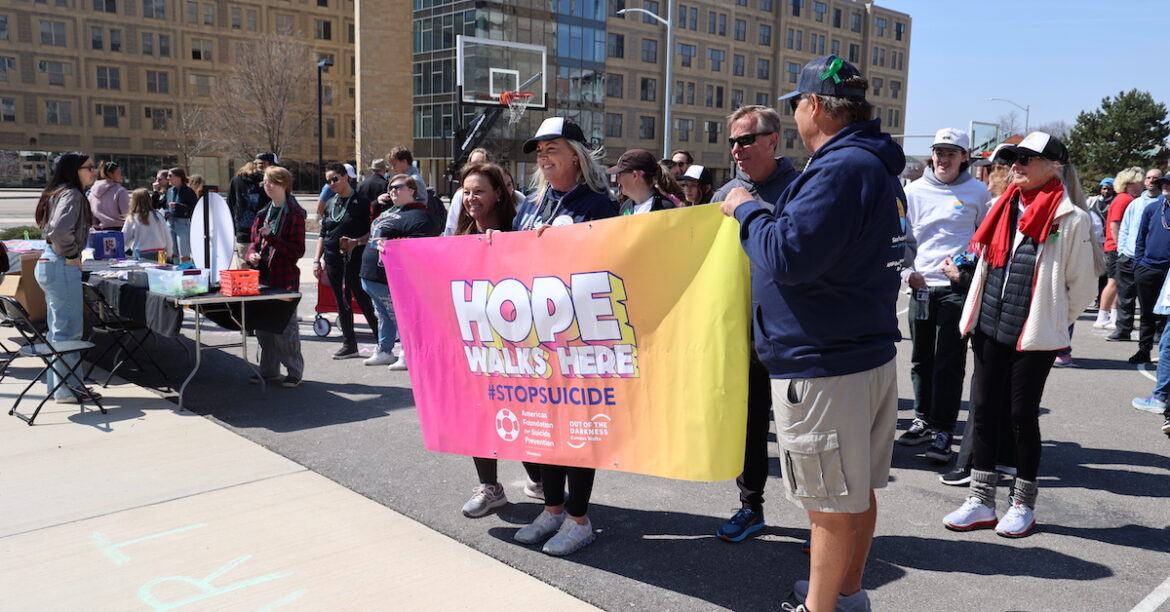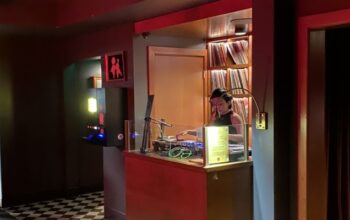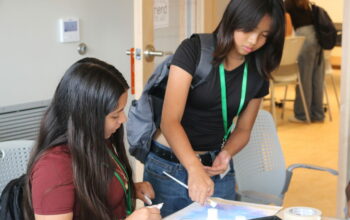The April sun shines down on the dark pavement of the Sellery basketball courts on the UW–Madison campus. Chalk scatters the ground, leaving behind hearts, rainbows and pastel words of comfort. Music echoes through the square. Though dozens of people gather in the area, and though the day is bright and warm, laughter is light. People talk and smile — some in a way where it doesn’t reach their eyes.
But that’s OK because today is a day to feel whatever needs to be felt.
Today is a day for grieving. Today is a day for hope. Today is a day for unity.
People from all over the community show up — over 200 participants of all ages, backgrounds, genders and identities. Some participants walk in other regions of the U.S., supporting those walking in Madison from far away.

Out of the Darkness Walks — meant to raise awareness and funding for suicide prevention research — happens all across the United States each year, on college campuses and in more than 400 U.S. communities. All who gather to walk the mile loop from Sellery, towards Library Mall, past the Nitty Gritty and around the Kohl Center, understand the impact of suicide.
“If you don’t struggle or if you haven’t personally lost someone, I guarantee you, you know someone who has. They just might not be sharing it,” said Hailey Shevitz, the walk chair for Madison and a junior at UW–Madison.
Suicide is the second leading cause of death in Wisconsin for people aged 10 to 34, according to 2023 data from the Centers for Disease Control and Prevention. Across the country, the American Foundation for Suicide Prevention organizes Out of the Darkness walks to raise money for suicide prevention research. On April 12, people from the Madison community came together to inspire hope and awareness surrounding the issue. Their efforts reflect a larger movement to shred the stigma surrounding mental health and fight suicide with empathy, support and empowerment.
“There are certain experiences in life that words can’t describe, but physically being in a place where people understand is like a community,” Shevitz said.
She lost her cousin, Matthew, to suicide in 2020. He was 15 years old.
Shevitz recalled seeing Matthew in the days before he died. She had no idea what he intended to do. Suicide is preventable, Shevitz said, and that is what prompted her to channel her grief into the Out of the Darkness walks.
To honor Matthew, Shevitz put together a walk team called “Matthew’s Mission.” Many members of her family — based in Pittsburgh — joined her by walking in their home state.
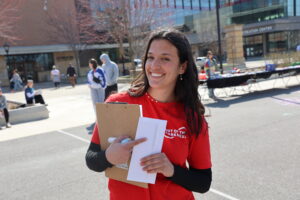
"The physicality of creating a space for people to grieve and to laugh and to talk about their loved ones and struggles is really impactful," Shevitz said.
The rate of suicide in Wisconsin has steadily risen since 2019, according to the Wisconsin Department of Health Services. The Department of Health Services reported that more that 122,000 people were impacted by suicide in 2021, including friends and family of those who died.
The walks are a way for those affected to feel this impact together. Shevitz said that many people who have lost someone to suicide may feel guilt or shame, describing it as a “weight.”
“A piece of that melts away at an event like the Out of the Darkness Walk,” Shevitz said.
Xenette McKiernan, a certified life coach from the area, attended the walk with her 10-year-old son. McKiernan lost a family member to suicide roughly six years ago. She came out to advocate for prevention and mental health.
“It’s important to let the words out and let people who are suffering know that there are resources everywhere,” McKiernan said.
The 988 Wisconsin Lifeline received more than 72,000 calls for mental health and substance abuse support between July 2022 and July 2023. Almost 20,000 others used the line to text or chat about their need for support. Of the roughly 90,000 contacts, counselors were able to resolve over 98% of them through de-escalation, listening and referrals to local providers.
Many people, however, don’t know about the resources available to them.
“We’re becoming a lot better, but one of the biggest issues is that people don’t really tend to believe that mental health is important and that mental illness is real,” said Byron Bushara, a student at the UW–Madison Law School. He attended the walk with other law students to fight mental health and suicide stigmatization. “This brings awareness around something that is real and something that really affects people’s lives,” he said.
At the walks, people can even share their stories surrounding suicide without using words. Honor beads are a way for people at the walk to find community and connection without having to say anything. Walkers can select beaded necklaces of different colors that signal their associations with suicide — green for personal struggles, purple for loss of a friend or relative, rainbow for the LGBTQIA+ community and more.
“You are not alone, but it’s hard if you’re struggling with suicidal ideation or if you’re going through grief — it is very hard to not feel alone," Shevitz said. “The walk is a physical embodiment of ’You’re not alone.’”
So far, the 15th Annual Out of the Darkness Campus Walk in Madison has raised more than $28,000. Donations stay open into the summer.
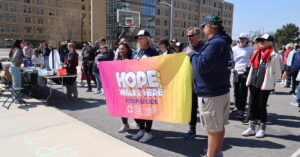
Photo by Esther Launstein.

